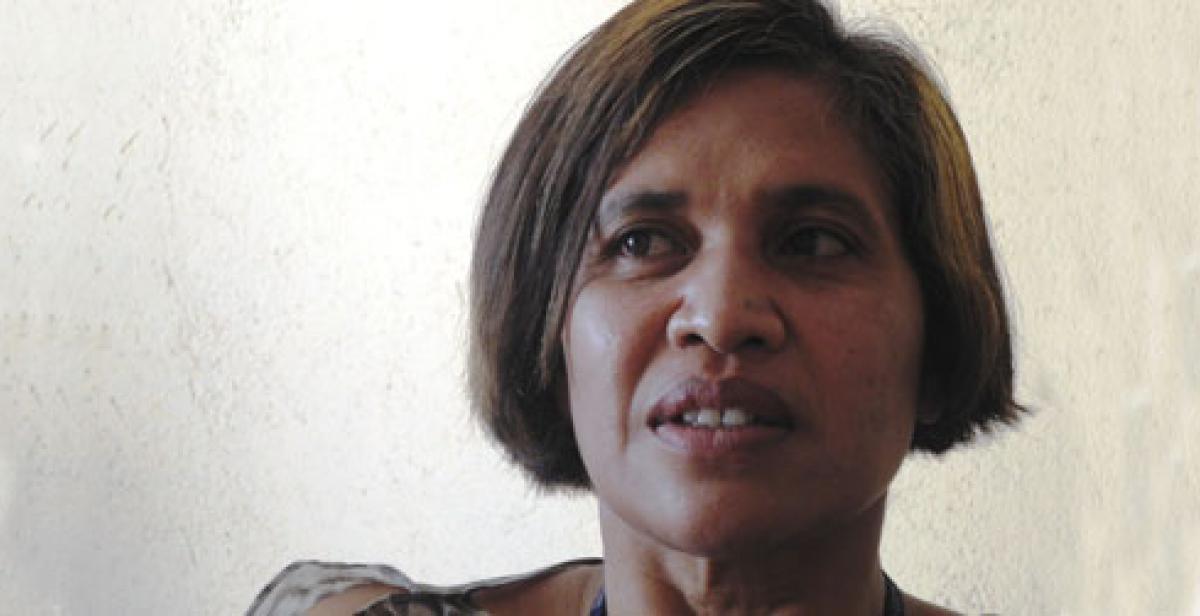Domingas Tillman is a force to be reckoned with.
After witnessing domestic violence throughout her childhood she vowed never to get married and joined a convent. This seemed like the answer for a while but she fell in love and ended up becoming a wife and mother instead of a nun. She and her husband had six daughters and a strong and happy marriage before he passed away in 2010.
As a result of her own childhood experiences, Domingas has dedicated her adult life to helping other victims of domestic violence.
Safe house
In 2006 she set up her first safe house for women who have suffered at the hands of their husbands. The house had two bedrooms, an office and a counselling room. In 2010 Domingas had to find larger premises as so many women were turning up at her door, and the safe house she now runs has room for 12 women and a separate admin block.
Progressio development worker Victor Owuor has run training sessions on human resources and managing finances, which Domingas has attended. She is also part of the local NGO network, which offers support to small organisations.
Dealing with trauma
At present, there is only one woman staying at the safe house but this figure fluctuates a lot each month. Domingas shares the story of a woman staying in the safe house at the moment:
"This lady has been here for three months. She is extremely traumatised. When she was younger her family forced her to marry a man she didn't like and he was very cruel to her. She managed to run away with their new-born baby but the baby died as a result of her homelessness and she had no option but to return home. This happened twice.
"People in the town saw her wondering around, sleeping rough, and rumours spread that she had mental health issues. On her third time of running away, leaving two children behind this time, she was picked up by a gang who forced her into working as a prostitute.
"Eventually the police found her and brought her to the safe house. At first she could not even communicate and she is still too afraid to see men.
“We provide regular counselling sessions and have helped her to reconnect with her past in a positive way through sewing – making and embroidering simple garments or soft furnishings, which she enjoys and is really good at."
Going back to their communities
Domingas and her volunteers always try to open a dialogue between the women who come to them and their families. The aim, where possible, is to reintegrate the women back into their communities. Families and neighbours have great importance in Timor-Leste and it is extremely difficult, not only financially but socially, for a woman to live by herself.
Domingas is modest about all that she has achieved. She is wary of the relationships with men her daughters might pursue now they are growing up but hopeful for a positive change in the way people regard domestic violence.
“The new law prohibiting domestic violence is a good step,” Domingas says, “but it is difficult for it to be enforced because women are still scared of coming forward and speaking out against their husbands; some communities and families will actively discourage it.”
The return of women to their communities is carefully monitored by Domingas, her volunteers and specialist mitigation lawyers brought in to draw up a declaration that must be signed by the husband promising to stop harming his wife.

Positive about changing attitudes
Whilst walking around the safe house Domingas explains how they have tried to make it as safe as possible without being too institutional. “Sometimes the women who come here feel as though they are the ones held captive,” Domingas explains, “whilst their husbands are free to live in their home and go on living life as normal.”
This is one of the reasons Domingas and her team only offer short term residency – up to six months. If a woman is still unable to return to her family after six months she will be given a place at another safe house run by an order of nuns and where long term care and facilities are provided. Sometimes it is better for women to go straight there after only one or two nights with Domingas because of the danger posed by their husbands or families.
The way forward, as far as Domingas is concerned, involves “Changing attitudes about domestic violence through rigorous law enforcement and social awareness campaigns. Education in schools, churches and families is also vital to reduce domestic violence.”
Domingas speaks matter-of-factly about all she has encountered. If she was once a victim she certainly doesn’t behave as one and has a gift for passing on this enthusiasm for life worth living.
Lucy Jenkinson is Progressio’s media officer. She visited Timor-Leste in September 2012.



